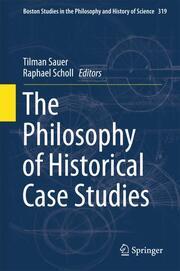Detailansicht
The Philosophy of Historical Case Studies
Boston Studies in the Philosophy and History of Science 999, Boston Studies in the Philosophy and History of Science 319
ISBN/EAN: 9783319302270
Umbreit-Nr.: 9063039
Sprache:
Englisch
Umfang: viii, 296 S., 25 s/w Illustr., 296 p. 25 illus.
Format in cm:
Einband:
gebundenes Buch
Erschienen am 02.06.2016
Auflage: 1/2017
- Zusatztext
- This volume collects reflections on the role of philosophy in case studies in the history of science. Case studies have played a prominent role in recent history and philosophy of science. They have been used to illustrate, question, explore, or explicate philosophical points of view. Even if not explicitly so, historical narratives are always guided by philosophical background assumptions. But what happens if different philosophies lead to different narratives of the same historical episodes? Can historical case studies decide between competing philosophical viewpoints? What are the criteria that a case study has to fulfill in order to be philosophically relevant? Bringing together leading practitioners in the fields of history and philosophy of the physical and the life sciences, this volume addresses this methodological problem and proposes ways of rendering explicit philosophical assumptions of historical work.
- Kurztext
- This volume collects reflections on the role of philosophy in case studies in the history of science. Case studies have played a prominent role in recent history and philosophy of science. They have been used to illustrate, question, explore, or explicate philosophical points of view. Even if not explicitly so, historical narratives are always guided by philosophical background assumptions. But what happens if different philosophies lead to different narratives of the same historical episodes? Can historical case studies decide between competing philosophical viewpoints? What are the criteria that a case study has to fulfill in order to be philosophically relevant? Bringing together leading practitioners in the fields of history and philosophy of the physical and the life sciences, this volume addresses this methodological problem and proposes ways of rendering explicit philosophical assumptions of historical work.
